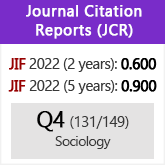El trabajador de fin de semana en la sociedad del ocio. Tiempo de trabajo y calidad de vida en el sector servicios
DOI:
https://doi.org/10.3989/ris.2004.i38.254Keywords:
Weekend Work, Quality of Life, Leisure Time, Social Inequality, Sociology of Work, Sociology of time, Post-modem SocietyAbstract
This article presents the results coming from a qualitative research carried out to reveal the emergent consequences that weekend work has on the life style and quality of life of workers. Until now, the sociology of work, and also political and social agents, has paid very little attention to weekend work, if any. On the contrary, there are many more studies on evenings and nights shifts. Weekend work is very relevant because it implies a radical interchange between leisure time and work time. While weekend workers are working, the rest of the people are enjoying their free or leisure time. On the contrary, when the weekend worker has his free time, the rest of the people are working. In fact, this asynchrony of his social time explains the most part of the negative consequences which come from weekend work. Weekend work reveals what we could name as the labor paradox of leisure society. In this society it is impossible that everybody enjoys free time simultaneously. Leisure society is a myth that masks a radical social inequality Characteristic of postmodern societies.
Downloads
Download data is not yet available.
Downloads
Published
2004-08-30
How to Cite
Bericat, E. (2004). El trabajador de fin de semana en la sociedad del ocio. Tiempo de trabajo y calidad de vida en el sector servicios. Revista Internacional De Sociología, 62(38), 35–59. https://doi.org/10.3989/ris.2004.i38.254
Issue
Section
Articles
License
Copyright (c) 2004 Consejo Superior de Investigaciones Científicas (CSIC)

This work is licensed under a Creative Commons Attribution 4.0 International License.
© CSIC. Manuscripts published in both the printed and online versions of this Journal are the property of Consejo Superior de Investigaciones Científicas, and quoting this source is a requirement for any partial or full reproduction.All contents of this electronic edition, except where otherwise noted, are distributed under a “Creative Commons Attribution 4.0 International” (CC BY 4.0) License. You may read here the basic information and the legal text of the license. The indication of the CC BY 4.0 License must be expressly stated in this way when necessary.
Self-archiving in repositories, personal webpages or similar, of any version other than the published by the Editor, is not allowed.

















